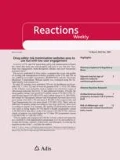Reference
Seo Y, et al. Prosthetic knee joint infection due to Listeria monocytogenes bacteremia in a diabetic female. Korean Journal of Internal Medicine 31: 616-619, No. 3, May 2016. Available from: URL: http://doi.org/10.3904/kjim.2014.361 - South Korea
Rights and permissions
About this article
Cite this article
Fludrocortisone/prednisolone. Reactions Weekly 1608, 123 (2016). https://doi.org/10.1007/s40278-016-19135-6
Published:
Issue Date:
DOI: https://doi.org/10.1007/s40278-016-19135-6

